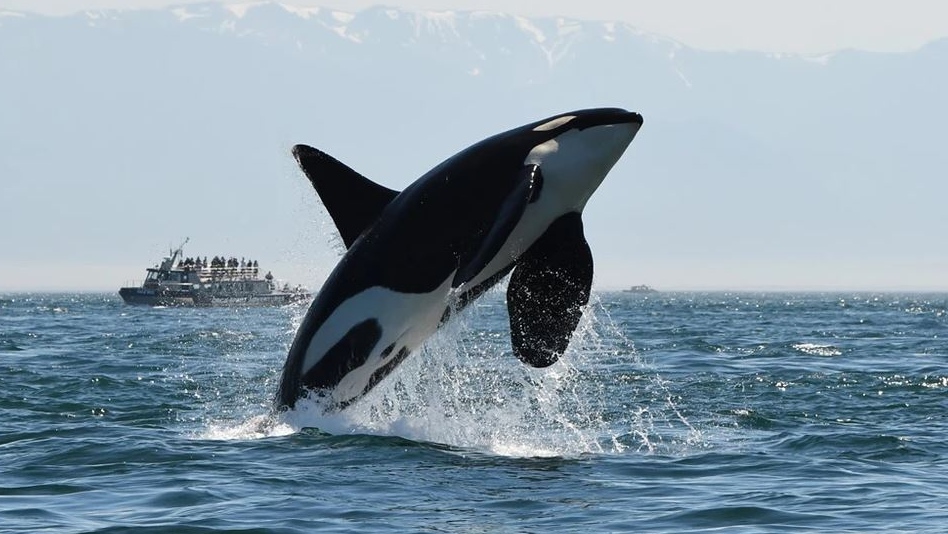Endangered orcas suffered calorie deficit in recent years: UBC study
 Southern resident orca K25 is seen in mid-breach. Researchers now fear the killer whale is one of three endangered southern residents that have died. (Dave Ellifrit/Center for Whale Research)
Southern resident orca K25 is seen in mid-breach. Researchers now fear the killer whale is one of three endangered southern residents that have died. (Dave Ellifrit/Center for Whale Research)
A new study released by the University of British Columbia found that southern resident killer whales (SRKW) did not have enough to eat in recent years, which correlates to higher mortality and lower fertility rates.
The study tracked the critically endangered SRKWs over the past 40 years, and found that they did not get enough to eat in six of those 40 years – three of which occurred in the most recent years of the study, from 2018 to 2020.
On average, adult killer whales were about 28,716 calories short in their diet in the six years that deficits were recorded, or about 17 per cent of their average daily energy requirements, according to the study.
"With the southern resident population at such a low level, there’s a sense of urgency to this kind of research," said lead author Fanny Couture, a doctoral student at the Institute for the Oceans and Fisheries (IOF) and Ocean Wise, in a release Monday.
As of October 2021, the SRKW population numbered about 73 orcas.
CHINOOK SALMON DECLINES
The southern residents feed mostly on Chinook salmon, and when Chinook salmon populations declined, the orcas were affected, the study found.
"The years where southern residents were in an energy deficit are also years where other studies report lower population growth rate and higher mortality rates for the killer whales," said Dr. Villy Christensen, professor at IOF and co-author of the study.
Researchers are uncertain why Chinook salmon populations are declining, though there are several factors, including climate change, disease, and predation by other animals.
Commercial fishing also plays a role, though researchers say Chinook salmon harvesting was reduced in Canada in the late 1990s, and that salmon declines have continued over the past two decades.
"Those declines have continued despite severe fisheries reductions, and one very likely candidate for causing them is the massive increase in abundance of Steller sea lions since the mid-1980s; those sea lions now consume more fish than all the B.C. commercial fisheries for all species, combined," said Dr. Carl Walters, senior author of the study and retired professor at IOF.
MORE FISHING RESTRICTIONS MAY BE NEEDED
Researchers found that when Chinook salmon populations were particularly low, southern resident killer whales would feed on other types of salmon, such as chum. However, their energy deficits would still occur.
Study co-authors say more restrictions on Chinook salmon fishing may still be required to protect both the fish and the orcas, as well as further research into underwater noise pollution.
"Both killer whales and Chinook salmon, the southern resident’s main prey, are important, iconic species for the west coast of Canada," said Couture
"Studying what is happening to the population may help offer solutions, both for the southern residents and potentially other killer whale populations in the future."
CTVNews.ca Top Stories

LIVE B.C. seeks ban on using drugs in 'all public spaces,' shifting approach to decriminalization
The B.C. government is moving to have drug use banned in 'all public spaces,' marking a major shift in the province's approach to decriminalization.
Air traveller complaints to Canadian Transportation Agency hit new high
The Canadian Transportation Agency has hit a record high of more than 71,000 complaints in a backlog. The quasi-judicial regulator and tribunal tasked with settling disputes between customers and the airlines says the backlog is growing because the number of incoming complaints keeps increasing.
Orca calf that was trapped in B.C. lagoon for weeks swims free
An orca whale calf that has been stranded in a B.C. lagoon for weeks after her pregnant mother died swam out on her own early Friday morning.
AFN chief says Air Canada offered a 15% discount after her headdress was mishandled
After the Assembly of First Nations' national chief complained to Air Canada about how staffers treated her and her ceremonial headdress on a flight this week, she says the airline responded by offering a 15 per cent discount on her next flight.
Sophie Gregoire Trudeau on navigating post-political life, co-parenting and freedom
Sophie Gregoire Trudeau says there is 'still so much love' between her and Prime Minister Justin Trudeau, as they navigate their post-separation relationship co-parenting their three children.
U.S. flight attendant indicted in attempt to record teen girl in airplane bathroom
An American Airlines flight attendant was indicted Thursday after authorities said he tried to secretly record video of a 14-year-old girl using an airplane bathroom last September.
76ers All-Star centre Joel Embiid says he has Bell's palsy
Philadelphia 76ers All-Star centre Joel Embiid has been diagnosed with Bell’s palsy, a form of facial paralysis he says has affected him since before the play-in tournament.
More than 115 cases of eye damage reported in Ontario after solar eclipse
More than 115 people who viewed the solar eclipse in Ontario earlier this month experienced eye damage after the event, according to eye doctors in the province.
DEVELOPING Bird flu outbreaks: WHO weighs in on public health risk
The current overall public health risk posed by the H5N1 bird flu virus is low, the World Health Organization said on Friday, but urged countries to stay alert for cases of animal-to-human transmission.































